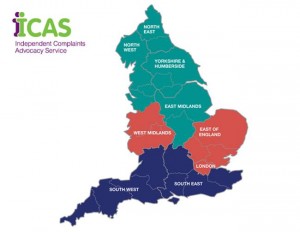Philippa Thompson ICAS Director, South of England Advocacy Projects, Kirstie Blencowe ICAS Director, POhWER, Alicia Raymond ICAS Director, Carers Federation
ICAS update April 2007:
Tendering process
Award of three new contracts by DH from 1st April 2006
5 year contracts for the delivery of service
Based on 9 English regions
Carers Federation – NE, NW, Yorkshire and Humberside and East Midlands
POhWER – East of England, London and West Midlands
SEAP – South East and South West
What is independent advocacy?
Advocacy is a way of empowering people to:
articulate their views, wishes and feelings themselves, or through a competent and independent voice
safeguard their rights
In order to:
ensure that services are accessible and appropriate, and identify gaps in service provision
ensure that the voice of the person is heard, and influences decisions made about him/her by those in a position of power
ADVOCACY PRINCIPLES
Independence:
Service providers (Statutory, Private & Voluntary)?
Best Interests:
- Advocate does not influence/take view
- Act as impartial conduit for client’s views regardless of own opinion
Confidentiality:
- Life-threatening threshold
- Client informed of limits
- Client kept involved if breach conditions met
Empowerment:
- Self-advocacy
- Client-led
- Client in control of advocacy process
- Nothing without consent of client
Service Provision
Generic service – accessible to all
Self advocacy and supported advocacy
Balance between remote support – telephone and email – and specialist support
Community and office based
National complaints statistics 2006/07 (draft figures)
7,561 new cases (supported or specialist advocacy
17,944 client contact (self advocating or signposting)?
6,437 cases closed
5,876 live cases at 31 March 2007
Complaint level
- Local Resolution 86%
- Healthcare Commission 10%
- P. H. S. Ombudsman 4%
Practitioner Area
- Medical 71%
- Nursing, Midwifery, Health Visitor 7%
- Dentistry 5%
Cause of grievance
- Multiple Aspects Clinical Treatment 12.8%
- Misdiagnosis 12.6%
- Attitude of staff 10.2%
Client age
- 0 -16 6%
- 17 – 59 52%
- 60+ 27%
- not stated 15%
Clients who disclosed a disability (1500+)
- Physical Disability 49%
- Mental Illness 25%
- Learning Difficulty 4%
- Other Disability 21%
Prison Clients
- Initial contacts 92
- Ongoing support 76
ICAS Focus on harder to reach groups:
- Prisons
- Mental Health
- People with learning disabilities
- People with physical disabilities
- Travellers
- Children and young people
- Black and ethnic minority groups
Case study
Care of patient with breast cancer
- Palliative care issues
- Short staffing
- Communication breakdown
- Compounded by time of year
Outcomes
- Matron shared experience and now sits on palliative care team
- Two side wards dedicated to terminally ill patients
- Extra staff training
- Specialist equipment
- Renamed the suite in memory of the patient
Working in partnership
With NHS providers , PALS and Patient Forums , With community and voluntary sector service providers , With other advocacy services
Through Networking plans, Shared knowledge, information and understanding, Referral protocols
ICAS providers working in partnership
Through:
- Joint publications and promotional materials
- Common branding
- Shared knowledge, information and understanding
- Referral protocols
What is happening now?
- Revised Self Help Information Pack
- Website development
- Multi-media DVD
- Posters
- Leaflets in ethnic minority languages and Braille
What the future holds
- Integration of health and social care complaints procedures
- Sharing information for effective service improvement
- Networking plans to build relationships
- Seamless transition for ICAS
ICAS… 5 years on

